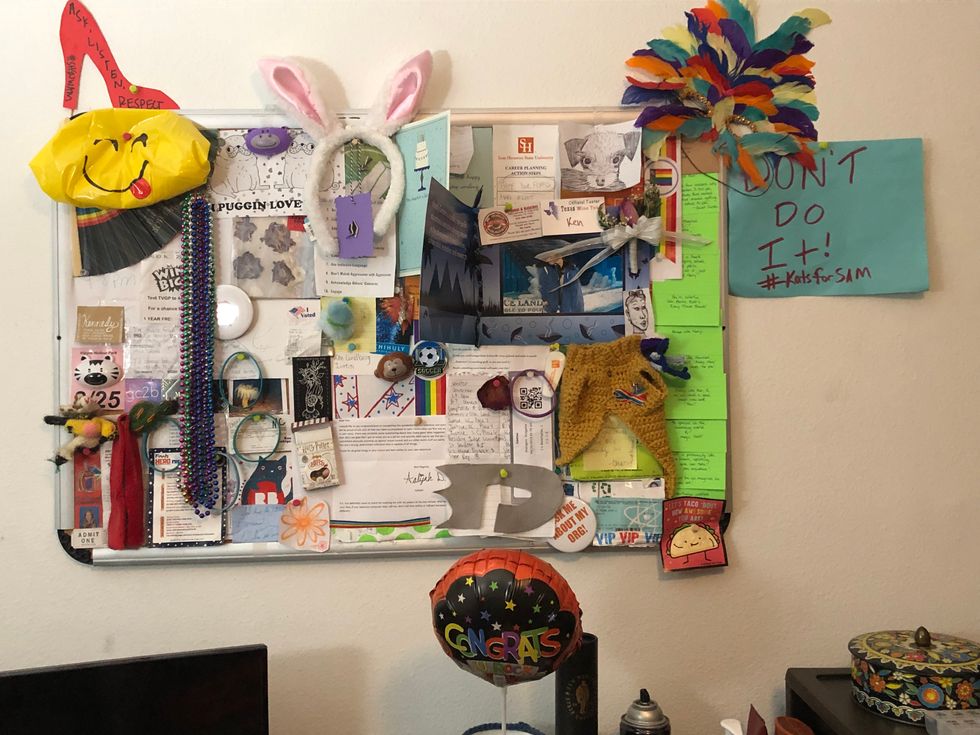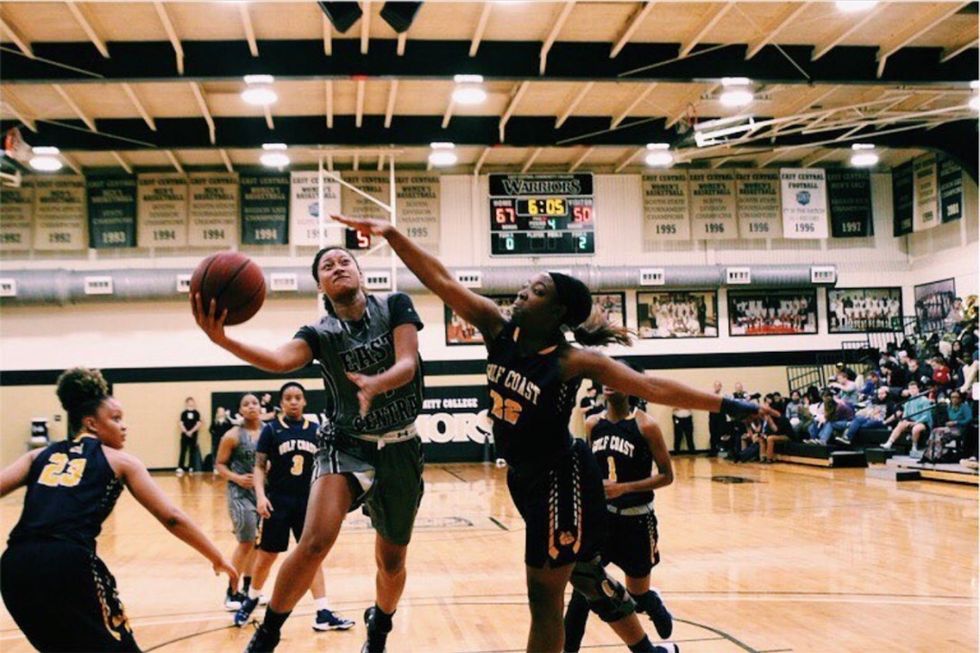Welcome back
Sign in to comment to your favorite stories, participate in your community and interact with your friends
or
LOG IN WITH FACEBOOKNo account? Create one
Lifestyle
I've Done A Memory Board All Throughout College And It's One Thing I'm Not Leaving Behind After Graduation
Making memories, counting blessings and starting anew is made easy by making an annual Memory Board
28 May 2019
193
Ken Lundberg
I've had the same corkboard during every move—all throughout Washington, California and now Texas.
Unfortunately, before my Senior year in high school, I thought nostalgia was for babies, so I mainly used it sparingly for drawings from my little brothers and the random photographs I came across.
That completely changed the night I attended the funeral of a friend.
It was the first time I had experienced death in such close proximity to myself. Her death was sudden and affected me for many ways I couldn't understand at the time, so I was extremely low that night.
The ceremony was beautiful and emotional but I spent most of it in a daze, which I was aware of as we sent her off holding thin white candles equipped with little paper skirts so the wax didn't drip on our hands.
I started to panic through the sobs because I couldn't handle the finality of the situation. I suddenly absolutely needed something to remember her by.
There it was in my hand, the little paper slip decorated with candle wax.
The next day I tacked it onto the cork board I had never found adequate use for before. It became the first in a collection devoted to my last year in high school and all of the most memorable moments there.
Oddly enough, I figured then it would be the last one—something special to commemorate a special era. So when I went off to college and lived in a dorm, I didn't think of its absence.
However, when I moved into my first apartment, I really wanted my own personal touch in my own official first place. I added the cork board more for that than any other reason.
Over time though, things just started to appear there. There wasn't anything specific to get the collection going like in high school, but I ended the year with a full Memory Board and a whole set of rules for what that entails.
1. Once something goes on there, it can't be taken off.
2. The items can't be selected for the board by someone else. Gifts end up on there, but I've got the final say.
3. The majority of the items need to be disposable.
4. When it's time to take it down, everyone who had a hand in an item on the board gets a thanks from me, whether or not they're in my life anymore.
All of these are totally essential to the essence of the board. Usually, they end up being things that I've found, given casually or are small enough to fit. This has been anything from receipts and business cards to crafts and Halloween costume accessories. The purpose of this is specifically so I don't get too hung up on the item itself.
The whole point of these memory boards is just so that I can still be reminded of the good, important moments when life seems mostly bad. Mental health can so often cloud my sense of reality, so these memory boards have become a sweet and easy way to keep myself tethered.
Now, I can sit back and reflect on the last four years, the people that made them happen, achievements I earned, fun nights that were had, and high and low points that serve as a timeline for the whole school year and the summer.
Although I need to change my timeline now to match calendar years rather than school years, the Memory Board has become a vessel of self-care, creativity, pride, nostalgia, and gratitude, and I can't wait for the ones in years to come.



Keep Reading...Show less
Lifestyles
From Student-Athlete to N.A.R.P.: How to Adapt
The final article of the series has arrived. If this transition has been a struggle for you, read on to learn how to adapt to the change.
01 April 2019
217
Laneisha Jeans
Once you've done something for so long, it becomes a routine. However, once you abruptly interrupt your routine, you can become shell-shocked. This is not uncommon.
After I stopped playing, it was like I didn't know who I was anymore. I had no idea what to do with my free time, and most times, I wasn't even motivated to do anything. For a while, rather than confronting the issue and being honest with myself, I wallowed in my sorrows and let the depression consume me. I know that post-retirement depression in student-athletes is a very common issue, and I want to help.
The journey of self-discovery since my retirement was long and tedious, but I am here to offer 7 useful tips to assist you. These are tips I wish someone would've told me when I was going through it all, and I know they will bring you one step closer to success if you follow them.
1. Acceptance & Forgiveness.
One thing I found I had the most trouble with was accepting the decision I made, and forgiving myself for it. So many times I felt guilty because I chose to stop playing. I felt like I let my parents down. I felt like I disappointed every coach and every recruiter who ever helped me get to where I was. I felt like I let my little sister down, and most importantly, myself. So many questions ran through my mind daily that made me second guess myself. I needed reassurance that I made the right decision. I had to remember that I made this decision for my own happiness and mental health. No matter the situation, your mental health needs to be considered a top priority. You need to accept it for what it is, and stand up for it. You did what was best for you, and although you can't see it clearly yet, things will begin to look up sooner than you think.
2. SELF-CARE, ladies and gents.
It may sound stupid because it's one of the most trending things on the internet now. You see it in the form of doing face masks or taking long baths with bath bombs. It may be corny, but it's definitely helpful. Don't be afraid to take time for yourself. Sometimes it's okay to isolate yourself if you need to recharge. Do things that make you feel good internally and focus on what makes you happy. Self-affirmation is key. Hype yourself up sometimes!
3. Write in a journal if you can.
Journaling is a great way to get your emotions out there, but not really out there. Maybe you're like me and don't like expressing your feelings to any and everyone. Putting them in a journal is an efficient way to release your stressors, as well as a way to see your progression. It's nice to be able to look back at what you wrote once before, even the hard parts, so you can look at how much you've grown. Write when you feel good, or write when you feel bad. The point is, just get your thoughts out there.
4. Don't let social media consume you.
As most athletes, your social media timelines are probably oozing with posts from other athletes you know. During this time of recovery it took a while before I was really comfortable watching basketball again. I didn't want to make myself feel bad about my decision and I felt I truly needed a break from it. Social media can be toxic if you let it, and if you need to take a break to refrain from filling negative thoughts in your head, don't be afraid to do so. Move your attention from your phone to the real world. Meet new people and make new connections. I took a break from Instagram for a few months and it wasn't as bad as I thought it would be. It was actually refreshing and felt good to focus on my reality, rather than my social networks.
5. Discover new forms of self-expression.
If your sport was your emotional outlet, it can feel difficult to find something new that interests you, or is an emotional release. Don't be afraid to try new things, maybe you'll find that there are other creative layers within yourself. Find new activities that make you happy. Even do a little research, you never know what you'll find.
6. Put yourself out there.
Sports can be magnets for new friends and colleagues. When you're no longer playing, you may find it difficult to meet new people or get involved. Don't let fear stop you from putting yourself out there and exploring. Talk to your classmates, find out what they're into. Who knows, maybe you guys will be the best of friends, or maybe they'll introduce you to someone you mesh with better. Take advantage of all opportunities, even if they seem unusual for you. The best way to successfully navigate through this self-discovery is to dive in head first. You wont know unless you try. Get around people who make you happy, and hold on to the good moments, as well as your progress.
7. TRUST YOUR GUT
I am a firm believer in trusting your gut. If you don't know what else to do, lock down and listen to yourself. Only you know what you truly want. At the end of the day, when you're trusting yourself and your decisions, you can look back on your past with no regrets because that is what you wanted at the time. Do what you feel is right, and don't let anyone allow you to doubt yourself.
The whole purpose behind these tips is to allow healing athletes to build themselves back up. It's never easy when something you did everyday is no longer what drives your daily schedule anymore. You get so comfortable doing something that you think you can't function without it. Like I've said before, your sport did not define you. Plenty of us are still in the ripe years of our twenties, and if you think you're the same person throughout your whole lifetime, this journey will reveal the truth to you shortly. Life is about growing and evolving. The best advice I can give is to accept the changes, step into your cocoon, and watch the newly transformed butterfly thrive.
Keep Reading...Show less
Subscribe to Our Newsletter
College
The Process Of Transferring Colleges, As Told By A Current Transfer
I am applying to colleges as a transfer student and it can be a struggle.
20 November 2018
189
Whether you're a freshman in college or you're finishing up your last year, or maybe you're already in Graduate school, you must remember the process of applying to colleges and how stressful it was. Luckily for me, I decided to go to my local Community College before transferring to a four-year university.
But now, the time has come where I have to start making plans to transfer. As an English major, I have had to do intense research to find the right programs that can offer a place for me to grow and prosper. The transfer process has many steps with it, the first being applying to colleges. This step can be very tricky because various colleges have various application dates that sometimes start early and sometimes start late.
My number-one college's application doesn't even open until January which makes it a little difficult for me to plan properly.
Financial aid is probably the most important aspect of college because if there is no way to pay for college, then it is pointless to even apply to colleges.
Next, finding somewhere to live is important because you have to sleep somewhere right? The idea of transferring is terrifying for many reasons but the main reason, a new city with new people. I'm not the best at meeting new people because I tend to have terrible social anxiety that stops me. So, I've decided to leave it in God's hands for he has a plan and I just need to remember that, everyone needs to remember that.
Keep Reading...Show less
Student Life
7 Myths About Community College You Can Declare As Fake News
They're just as bad and unprofessional as Donald Trump's tweets.
24 September 2018
2833
Emilia Rodriguez-Vera
Growing up in the second snobbiest city in the US that literally lived up to its title was absolutely no joke. In my city, attending community college was more frowned upon than not going to college at all because most people not only could afford to send off their kids to four-year institutions RIGHT AFTER high school but pushed it intensely on them.
After attending community college for three years, I can attest that the following is a bag of bologna.
1. You're only going to community college because you're not as intelligent as your other peers

This one grinds my gears the most. I do have to admit, I did not have the best grades in high school and I would have probably never gotten into schools like UC Berkeley or UCLA back then. I lacked the plethora of AP classes my other peers took and was not involved very much in my academics. I got accepted into a few random universities that I applied to back in high school so my intelligence level had little to do with why I decided to go to community college. Community college gave me the opportunity to become the better student I wish I could have been in high school and showed me that I do have the capability to be as smart as those I went to high school with.
2. Community college does not offer any help nor good services to those attending that would be offered at a four-year institution

Each community college is different but the like most educational institutions, the staff and faculty are there to help their colleagues and their students. They want students to succeed in their educational journey and provide their office hours and contact information just like university professors do. They have academic advising counselors to guide students to ensure that they are taking the correct courses in order to transfer and plan our time at the community college. They have a great number of resources for internships, jobs, transfer guidance, etc. My community college had a health center which provided students with basic needs such as cough drops, asprin, Bandaids to flu shots, pregnancy tests, STD tests/condoms, psychological help, nutritional help, and so much more.
3. You're only going to community college because you can't afford a four year institution

To some, this might be a reality but there are those who attend a four-year university, cannot afford it and get loans or receive substantial financial help from grants and/or scholarships. There are VARIOUS reasons on why someone chooses to go to community college and the financial aspect is an important one for many but not for all. There are people who can afford to go to a university but choose to do community college instead. There is so much economic diversity at community colleges just like at regular universities, not everyone is low income.
4. A degree from a community college is not worth anything

It may not be AS valuable as a Bachelor's degree but it definitely shows that you worked to obtain a college degree (or multiple degrees if you're anything like me) before finishing your undergraduate program. In some careers, they might not mean anything but they look good on resumes and hype you up especially when applying for internships and jobs that are competitive among people with the same Bachelors as you.
5. Community college is an easy ride compared to a university

College is not for everyone, not even for those who actually attend college. Course loads are rigorous and there is so much to learn in a short amount of time. To some people, it can be a breeze but to most, it takes a lot of work and effort in order to do well in college leveled academics. Community college is not easier than universities as a lot of courses have to be similar to those general education courses offered at universities.
6. Professors who teach at community colleges are under qualified compared to those at universities

Surprisingly, many community college professors also teach or have taught at universities. It is really neat to have those professors since you get a taste of what taking their course at a university would be like but paying a LOT less for it. Even if they have not taught at universities, it does not mean they're bad professors compared to those who do teach at those institutions. I've been lucky with most of the professors I have had in community college and hope to get great ones just like them at my university.
7. You're not getting the full college experience that you would at a university if you go to a community college

Community colleges are primarily filled with commuter students so there is no on-campus housing available like there are at universities nor does Greek life exist. Although those are mainly available at a university, you can still get a full college experience. If you move out from home into an apartment, you can say you're on you're own. As for Greek life, there are Greek honors societies for community colleges (such as Phi Theta Kappa, which I was a part of) rather than fraternities and sororities. Community colleges offer so many events for students such as club rush to join clubs and other organizations, athletics, performing arts, and so much more!
Keep Reading...Show less
Education
11 Things You Understand As A Community College Student
If you've opted for your local junior college as opposed to a four-year university to pursue higher education, these are some truths you know well.
27 June 2018
231
Lone Star College - Montg
Community Colleges were first introduced in the Gilded Age by reformers seeking quality control at universities and social mobility for populist America. Championing inclusivity and accessibility, they earned their label as the "people's colleges," an epithet that still rings true today. Junior colleges overall are inexpensive compared to four-year institutions and represent a practical option for Americans from all walks of life.
However practical they may be, they still carry a stigma for being an unselective, last-resort option for pursuing higher education. Prospective students typically shy away from this relatively debt-free option, citing a desire to enjoy a vibrant campus life away from the monotony of their hometowns and the watchful eyes of their parents 3/5 of the year.
Not you, though. No. Being the individual you are, you stayed. While your friends got the hell out of dodge, you signed up for classes at your local junior college after high school graduation. Or maybe you took a gap year first, while some of your friends were switching out of their dream majors because of a few lousy weed-out classes. Either way, this is where you are at, and as a community college student, these are some truths you know all too well.
1. Friends are hard to find.
The great thing about community colleges is that they are perfect for people with their own life already in place. I.e. real adults. People with kids, established careers, and mortgages. Very few people are in your same walk of life. This makes finding friends that are similar to you so much more difficult. This isn't necessarily a bad thing, though.

2. You need everyone around you to understand how competent you are.
The reason you aren't at your dream school has nothing to do with your intelligence or admission status, and everything to do with pragmatics. You have your reasons.

3. You are thankful for the small class sizes and professors who actually care about your success.
Lecture halls and weed-out classes? No thanks!

4. You feel a little isolated.
Your friends are out at bars, living it up in greek life, geographically removed from any responsibilities other than making it to their 9 AM that calls for an iClicker. Meanwhile, you are at home, cantankerously reminding your siblings to leave the toilet seat down (rest assured, you aren't missing out on dorm life).

6. People are helpful.
Everyone really cares about your success at a junior college. They want you to thrive in your environment, so much so that they make sure you know exactly what your resources are, i.e. the writing help center, library, free printing, the gym, and student services, and how to utilize them.

5. A word about siblings.
Because your weird schedule may leave you at home more frequently during the day than their high school selves, they automatically assume you aren't busy. Don't worry, once they find themselves in your position, they will realize there's nothing lax about teaching yourself an entire semester's worth of microbiology because your teacher has an accent and reads off the slides verbatim.

6. Your parents treat you like a pseudo-adult.
You can start complaining when you pay rent.

7. You still have all the responsibilities you had in high school.
Pick Johnny up from football practice, clean your room, and turn the damn lights off when you leave a room.

8. You don't look to bars and nightlife to cut loose the way your pals at Universities.
It gets a little weird when you come home and your parents are less than amused by the drunken debauchery that occurred between you and your buddies. Or even weirder, when you spend the night somewhere else. That stuff only flies in college towns.

9. Did I mention that you (probably) live with your parents?
Year-round?

10. You yearn to be at the four-year university of your dreams.
Campus life, (semi)independence, and friends your age.

11. But then you remember tuition rates.
You laugh and revel in your lack of student debt.

This is an opinion piece based on the experience of a young community college student. I am aware my views may not accurately represent the experience of students over 18-22, who may not be dependent on their parents, and who lead well-established, independent lives with careers and other adult responsibilities while simultaneously seeking higher education. Hats off to you. And thank you, because your perspective and participation in the classroom and in student life alongside us newbies give us a sense of direction and guidance that we aren't otherwise exposed to.
Keep Reading...Show less


























